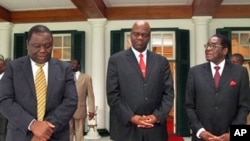After weeks of harsh political words and accusations, Zimbabwe's three political leaders held an end of year get-together at which each spoke of the need to see the inclusive government to its natural end, which is a new constitution and free and fair elections. After all the harsh political words, the Christmas messages of a common goal surprised many.
President Robert Mugabe and Prime Minister Morgan Tsvangirai say despite being "at each other's throats," they will work together in Zimbabwe's unity government until new elections, but gave no date for fresh polls.
After ferocious words aimed at Mr. Tsvangirai during last week's ZANU-PF annual conference, Mr. Mugabe looked relaxed and amiable Monday and went on to reassure the country that partisan political talk did not mean the inclusive government is dysfunctional.
"We looked at ourselves and saw ourselves not just as three people in principal positions, holding these positions on behalf of ourselves, we regarded ourselves as three principled men on a mission that had to be accomplished," Mugabe said.
Mr. Tsvangirai appeared equally relaxed with Mr. Mugabe and said the inclusive government's main function is to pave the way for its goal of free and fair elections.
"Bar the sceptics and their various views there is a consensus on this inclusive government," said Tsvangirai. "I believe, as the president has said, that the inclusive government is a transitional mechanism and it is up to us to ensure that it leads to an election."
Deputy Prime Minister Arthur Mutambara, the leader of the smaller MDC Party, says he will not run for re-election at the party congress in January. It is not clear yet whether his party will ask him to continue as a principal in the inclusive government, but on Monday he was alongside Mr. Mugabe and Mr. Tsvangirai encouraging economic growth.
"In the economy we have achieved economic stability," Mutambara said. "Where we were in the 2006 area, around a half a billion percent inflation, down to 3 percent, down to minus three percent. We have achieved stabilization in the country. The task now is to migrate from stabilization economics."
Many people outside the fractious political arena say they do not want elections in 2011 because they have not forgotten the violence inflicted by ZANU-PF militants in 2008.
They say elections will break the economy after decades of misrule that led to world-beating inflation and a worthless currency.
Mr. Tsvangirai easily beat Mr. Mugabe in the first round of the last poll in 2008, but pulled out of the run-off after more than 160 of his supporters were killed. After Mr. Mugabe won a one-man contest, and declared himself winner, African states shunned him and negotiations began for a political agreement between the three main political leaders.
Although many items in the political agreement, particularly new rules for elections and reform of security legislation, remain outstanding, Zimbabwe is largely peaceful and there is economic stability, but little growth.
Zimbabwe Leaders Preach Unity of Purpose




